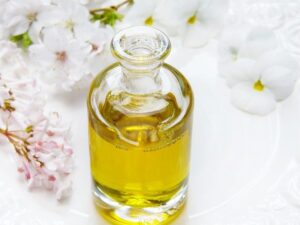
It’s everywhere.
Depending on the season and weather conditions, a fragrance tells us what’s in bloom or what part of town we’re in. From cherry blossoms and lemon trees to peppermint and pine, scents have the power to draw us in. The problem is, fragrance and scent are more than just powerful triggers of memory.
When synthetically-derived, fragrances are also the source of much short-term irritation and long-term health problems. In fact, throughout the skincare and scented products industries, synthetic and artificial fragrances have become the new secondhand smoke.
Not only do they affect the person using them, but those around them. And, in certain cases, everyone who comes after them.
Not a Perfect World

In the world of soap and skincare, “fragrance” no longer applies to any scent or aroma. It applies specifically to those that are “synthetically-derived.” According to the National Academy of Sciences, around 95% of chemical ingredients used in synthetic fragrances are derived from petroleum or crude oil.
Those ingredients include benzene derivatives, aldehydes, and phthalates. These have been shown to disrupt hormonal activity and linked to liver and breast cancer.
What It Used To Mean
For differing cultures over thousands of years, fragrance and its ingredients are associated with medicinal applications and healing. That’s still true where essential oils and aromatherapy are the focus.
But in the world of pervasive synthetic scents – the world of dryer sheets, air fresheners, scented candles, and odor-controlling garbage bags – more and more the associations are with negative health possibilities, including:
- migraines
- allergies
- skin rashes
- breathing problems
- chronic fatigue
- and more.
And those are just the immediate issues. Long-term effects are hard to nail down, but the possibilities aren’t good. They include cancer, diabetes, and obesity.
Fetal exposure has been linked to autism, ADHD, and neurological disorders. Continued exposure when children are young, through synthetics scents that have found their ways into bed linens, pajamas and everyday clothes, have been linked to developmental problems in breathing and disease resistance.
But We Can Find Out What to Avoid, Right?
Recipes are regarded as proprietary, and in the world of scented products, the rights of companies to avoid theft of recipes take precedence over the rights of consumers to avoid exposing themselves to potentially damaging ingredients.
There is legislation brewing at both the state and federal levels to change that situation and require full transparency, but the opposition is strong, well-funded, and very corporate.
Why You Should Choose Botanie
You can trust that we always formulate our soap bases with the highest quality organic oils and will never reach for cheap, filler oils like corn and soy. We always scent products using only high-quality essential oils. We always commit to policies of minimal waste, no animal testing, and other earth-friendly practices.
And, as always, we will always put you first.



